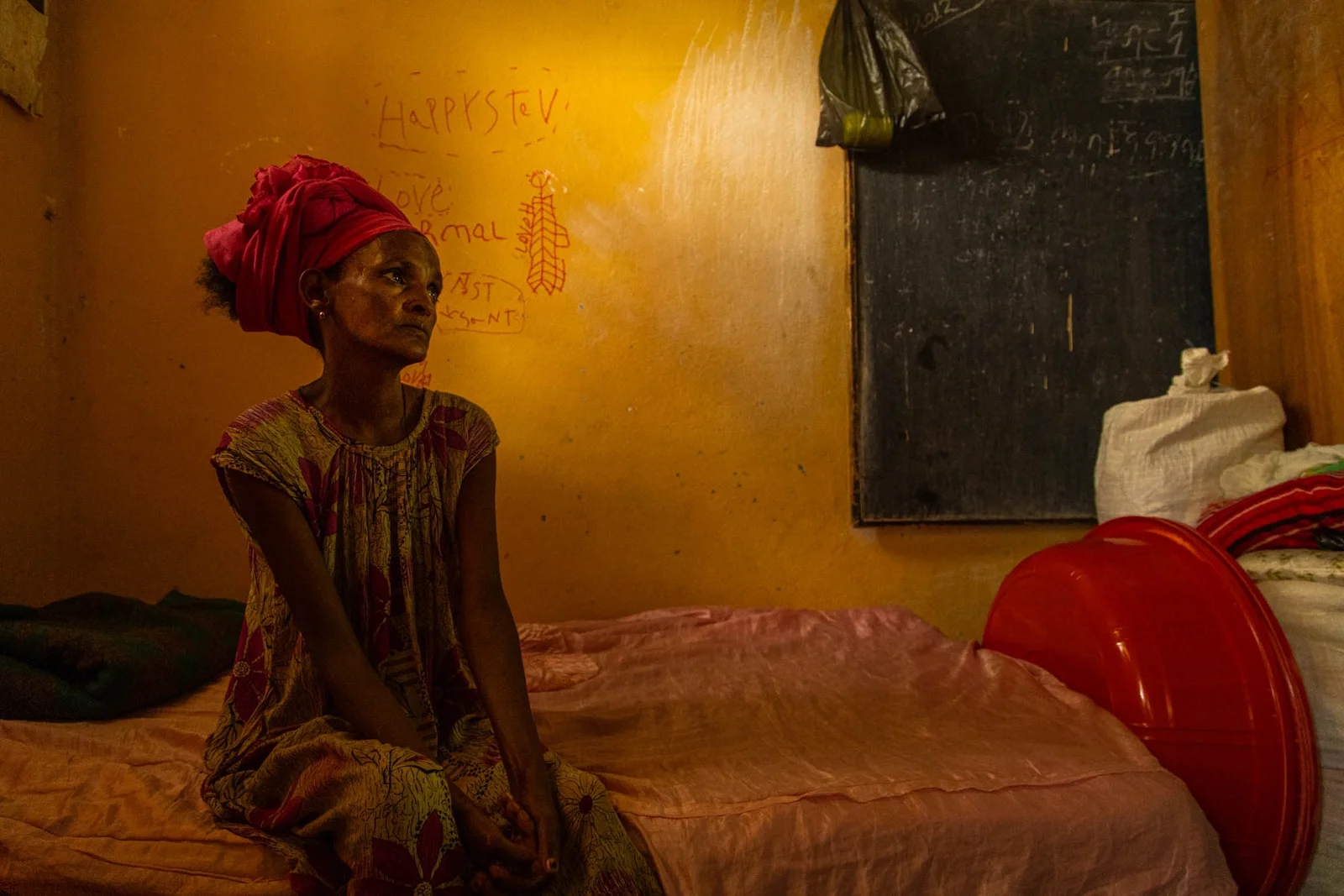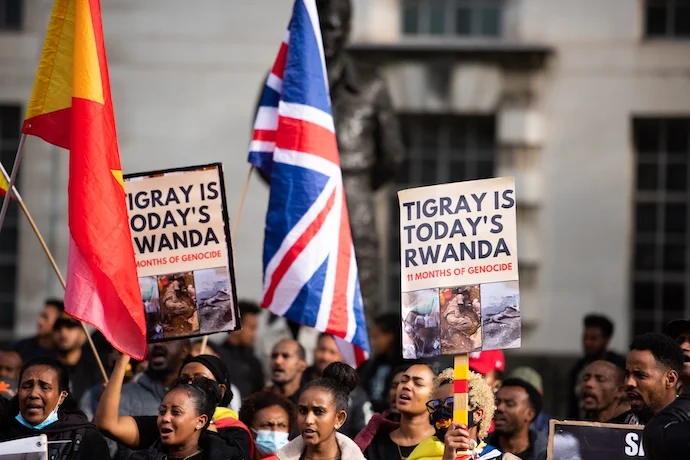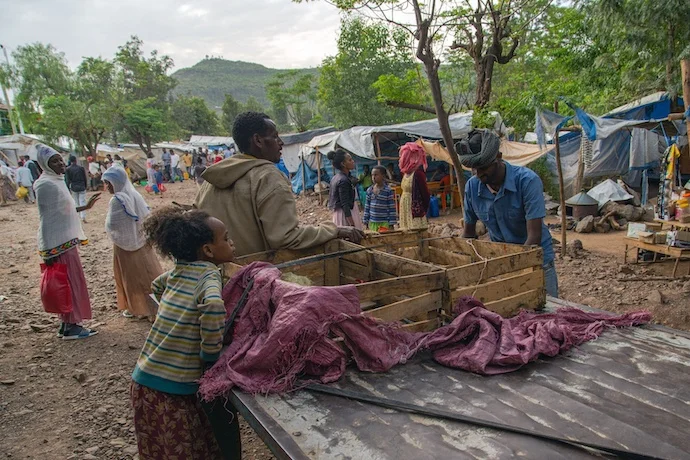
Irina Tsukerman on the International Community’s Failures in Ethiopia
Irina Tsukerman is a New York-based attorney specializing in human rights, national security, and international law. As the editor-in-chief of The Washington Outsider, she offers incisive analysis on global affairs and champions human rights. Her expertise spans the Middle East, Africa, Eastern Europe, and Latin America.
Tsukerman has been outspoken in her criticism of the international community’s inability to uphold the laws of war, enforce the Geneva Conventions, or impose meaningful sanctions on human rights violators. She argues that the complexities of modern conflicts—exacerbated by disinformation and waning media coverage—undermine accountability. Drawing attention to Ethiopia’s marginalized status on the world stage, Tsukerman has also shed light on the influence of external actors such as Iran, Turkey, China, and Russia. She warns that the war’s ripple effects in the Horn of Africa set a dangerous precedent, emboldening impunity and shaping the trajectory of conflicts like Sudan’s civil war.

Scott Douglas Jacobsen: I’m joined today by Irina Tsukerman, a New York-based attorney specializing in human rights, national security, and the dynamics of information warfare. With a JD from Fordham University School of Law, she serves as president of Scarab Rising, Inc., a boutique security analysis firm. Her expertise spans the Middle East, Africa, Eastern Europe, and Latin America. As the editor-in-chief of The Washington Outsider, she provides sharp insights into global affairs and advocates for human rights and security worldwide.
Our discussion will focus on human rights in Ethiopia, particularly with the Tigray War. To begin, which international legal frameworks could address the Tigray War, and which of these, if any, have failed to be implemented effectively?
Irina Tsukerman: International institutions have not performed particularly well in applying international frameworks. There was some commentary and pressure regarding reported human rights violations, but it is very difficult to apply frameworks without accurate information about each side’s actions in the conflict.
This is particularly challenging when identifying which participant in the conflict—more than two sides—committed specific violations. The general understanding is that all parties were involved in some form of human rights and humanitarian violations, but none of these violations were effectively addressed.
Various laws of war were violated. Anything related to the application of the Geneva Conventions was blatantly ignored, particularly regarding prisoners of war. They were not treated as such. Even though the various parties to the conflict were considered enemy combatants, they were not treated within the framework of the Geneva Conventions. They were not formally recognized as prisoners of war.
Instead, they were treated more like hostages, taken for trade at various points in time in a highly informal manner. There was significant cover-up and disinformation from all sides, particularly from the Ethiopian government, about what was happening.
This made enforcing any formal, structured international legal agreement extremely difficult. What is even more concerning is that there was no serious attempt to impose sanctions or implement foreign policy mechanisms that could have curtailed these massive human rights violations.
External parties outside Ethiopia were also involved, including Eritrea, as well as countries supplying weapons, primarily to the Ethiopian government, or smuggling weapons to other sides of the conflict. None of these parties were held accountable through any international or domestic mechanisms.
Attempts were made at internal peace talks and agreements mediated by elders from various communities. Although an attempt to settle the conflict internally was made, it was a profoundly imperfect solution. Ultimately, the Ethiopian government remained in power despite its responsibility for widespread human rights violations.
No one was brought to justice for these violations, and many individuals disappeared into prisons. There is no clear evidence that any judicial framework was applied domestically to resolve the conflict. Even after the formal conclusion of the war, the situation remains unresolved. There continue to be reports of random massacres, clashes, and other violent incidents.

Jacobsen: How does the principle of the Responsibility to Protect factor into this situation? Has it been seriously considered at any stage of this conflict?
Tsukerman: It certainly was part of the discussions, but the reporting on the issue was subpar to the point of being criminal and negligent. After the first few months of the war, the international media’s reporting dwindled to almost nothing.
There were some reports by international human rights organizations, but there was never a significant campaign to push the international community into action.
Even peacekeeping forces were not seriously considered, in part due to the complexity of the conflict, which spanned the entire country and involved multiple ethnic communities, political entities, and international forces, including those from Eritrea and mercenaries from other countries.
The conflict also implicated other zones and had the potential to spill over into broader issues, including the ongoing trilateral tensions between Egypt, Ethiopia, and Sudan over water-related concerns. As a result, there was no significant push to send UN peacekeeping forces or to implement any effective actions, and there was never a major international discussion to address this seriously.
We must also remember that the war began during the pandemic. Part of the international community’s lack of action was its preoccupation with COVID-19. The logistical challenges posed by lockdowns and closed borders made sending any international contingent impractical.

Jacobsen: Could this conflict have broader legal ramifications in the Horn of Africa? For example, could groups with malicious intent toward other ethnic communities use the international community’s failures during the Tigray War as a pretext to act with impunity?
Tsukerman: Absolutely, and it has already happened since then. The number one issue is that Ethiopians of all backgrounds, regardless of ethnic group, felt forgotten—especially in light of other conflicts that broke out later. They believed their conflict was neglected because it occurred in Africa and did not attract significant international interest.
Frankly, there were a lot of racist undertones to these concerns. For example, many believed that racial biases influenced the lack of serious international attention despite the massive casualties and deliberate violations of human rights. These were intentional massacres, not merely exchanges of fire or collateral damage. That perception of neglect and bias remains a significant concern.
Another concern was that Western countries did not have a particularly good political or strategic approach to Africa. Even when they had good intentions, they could not properly apply them. A lack of institutional knowledge regarding African conflicts and political matters complicated the issue.
There was also apathy and the perception that this conflict was not geopolitically important or impactful on broader international considerations. It was seen as less significant than conflicts involving global hegemons, such as Russia, or potential conflicts between China and Taiwan—conflicts involving major powers with global reach. Because Ethiopia is not one of those powers, and the conflict was largely domestic, the international community treated it as less relevant.
This neglect allowed perpetrators of human rights violations to get away with literal murder, remain in power, and maintain antagonistic relations with external powers, which could potentially spark future conflicts. It also set a dangerous precedent for others in the region. This was evident in the Sudanese Civil War, where parties observed how the international community mishandled—or ignored—the Ethiopian conflict. They concluded that resolving their power struggles through violent clashes would not face significant international pushback.
The international community often gained from such conflicts by providing weapons, consulting services, or even mediators without any substantial push to end them or the necessary tools.
Another factor was the involvement of international powers. Western powers took a backseat, while countries like Iran and Turkey became significantly involved. Iran and Turkey, for instance, supplied weapons, including drones, which became a critical military dimension of the conflict. These drones enabled the Ethiopian government to commit further human rights violations. Additionally, China and Russia were active on the ground, and tensions with Egypt over water-related disputes added another layer of complexity.
Some countries even backed particular ethnic groups for their strategic interests, further complicating the process. Border and sectarian issues added another dimension. Tribes from neighbouring countries became involved, pursuing their local interests unrelated to the larger political dynamics of the conflict.
All these factors made the conflict multidimensional, complicated, and challenging to resolve. It was also difficult to communicate the nature of the conflict in simple terms to the rest of the international community, which contributed to its neglect. The complexity and sectarian tensions in various African regions made this conflict an easy model to imitate elsewhere.
Jacobsen: Thank you for your time today. We should also have another session discussing the broader role of weapons and the tensions with Egypt.
Tsukerman: Absolutely. Let me know when you can do the follow-up, and I’ll make it happen.
